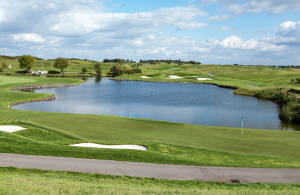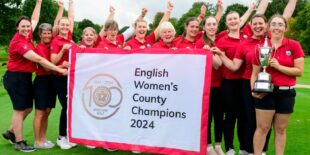How did you become involved with the GCMA?
I first met GCMA communications manager Mike Hyde at the 59Club Awards and we moved on from there. I’m a Brit, living abroad, and working on quite a reputable golf course – I guess it was a good idea.
Have you worked in the UK at all?
No. I went to university in Newcastle-upon-Tyne. In 1989, I got a grant to do Erasmus with the European Union. I ended up at Dijon, in Burgundy. I went to the university there for nine months, then I did six months in Spain – at the Chamber of Commerce in Malaga. It was 15 months and the time of my life. I went back to the UK, finished my degree, and then got offered a job in Dijon. I went and have never been back. That was in 1991. 
How did you get involved in golf club management?
Golf has always been a sport I played as a kid. I never wanted to be a pro, never really played for the county, or anything important. I just enjoyed my golf, was a single figure golfer. When I got to France, it was booming in the early 90s. It was booming on the growth of the number of golf courses – but not necessarily on the number of golfers. Lots of golf clubs were struggling to get members and struggling to survive, really. They’d been built but they hadn’t really thought about where the customers were going to come from. That first year, in 1991, I was working at the university in Dijon and helping, on a Wednesday and a Saturday, at the kids’ school. I was volunteering – giving free lessons to help the local pro create new golfers. It was a barter system, and I would get free golf. I could play as much as I wanted at the local club. I did that for a year and, during that, I must have caught the eye of the golf manager there. My French was improving rapidly and he said ‘would you like to come and be an events manager and try and help us get things moving?’ Then I thought about working in golf. I went into that in 1992 and have never left the industry since. From Dijon to the Ryder Cup… From Scunthorpe to the Ryder Cup.
There was an excellent bid, France did very well and the French Golf Federation did really well. A lot of that is due to one man’s vision and pushing and pulling. That’s Pascal Grizot. He’s still the chairman of the French organising committee. It’s brought up quite a lot of challenges for the French.
One of them is the golf club – what kind of golf club do they really want? They decided the one they had built, and envisaged, had lost track and moved away from its original story. It had to come back to basics, be shaken up a bit and modernised, and they needed somebody who had a bi-culture – both to talk to the European Tour and Ryder Cup Europe.
I suppose there weren’t many candidates who ticked all the boxes. You’d expect the French to get behind the Ryder Cup, but is this going to be a massive ex- pat excursion? The tickets that went on sale, last October, were daily or season tickets for individuals. Certain amounts were allotted to go on sale and then, after that, they get on and sell the hospitality and the sponsors get a certain amount of tickets as well. The tickets that went on sale sold out in two hours and 50 minutes. It wasn’t just 1,000 tickets, either. We are talking upwards of 40,000 tickets a day. Ticket sales went extremely well and the good thing, for the French market, is that Pascal Grizot got written into the final contract that the home country should get 40 per cent of daily tickets. Actually, 47 per cent were sold to the French. So France has got behind it. The next biggest market is the UK, for obvious reasons, but the Americans are coming in force – a lot more Americans than at Gleneagles.
What challenges are there in hosting a Ryder Cup? It’s a very different tournament to the Open de France you stage? The first challenge is that we have to deliver a golf course. Some of the logistics, security and transport – there are other people doing that, it’s not necessarily down to one team. I’ve an extremely good superintendent, Alejandro Reyes. He was brought in one year before me, in 2013, in a big change process. He is a magician, a very clever guy, a very nice guy, and he’s doing an absolutely brilliant job. He’s making my job a lot easier. Our main job for the Ryder Cup is got a city – a town – on your golf course. We went through that period of work and we were on time and on budget. My mission was not to organise the Ryder Cup. It was very clear. In my second interview, the first sentence was that. ‘Paul, we don’t need a director for Ryder Cup France. We need a guy to come in and turn this business around and make it ready for an international tournament. We’re going to be a massive bucket list golf course and we’ve just been pottering on and doing our own thing for 20-odd years. Change the whole thing. Get the staff ready. Get us ready for whatever’s going to fall on us and we’ll do the rest.’
That gives you purpose and clarity straight away…
Absolutely. When I was brought in I didn’t really know Pascal Grizot or Ryder Cup Europe and when you don’t know these people you have to win their confidence. It’s not a quick process. It’s not just by talking. It’s not just by coming in. I brought into that job application and interviews a project – ‘we’ll do this, this and this’. They said that was exactly what they were looking for.
“The course is looking good. The European Tour are happy. The European Ryder Cup captain is happy”
It’s not just good enough – to do the talking. You have to do the action. So it took about two years to gain all of the organisers of the Ryder Cup’s confidence. Now I am very much more involved in the Ryder Cup than I ever dreamed of as a golf manager.
What’s the split between Ryder Cup and day-to-day club work?
Right now, it’s at least half of my job helping take care of needs for the Ryder Cup and HNA Open de France. We are unique. There’s no other golf course in the world that organises a Ryder Cup and a main tour event in the same year. We’ve got both – with a build and a breakdown. It’s totally insane, but it’s going to be fantastic because it is so well organised. The good thing is it is the same promoters. The HNA Open, when it was brought into the Rolex Series, changed promoters to the European Tour. So we are now working on those two events with the same people.
How will the course recover so quickly from the Open de France? What if there is bad weather?
There’s no worries for the course. This year was extremely good. We held, on purpose, the Paris Legends Championship (Senior event) on the same weekend as the Ryder Cup so we could see how things had moved on, and the weather and the climate and what the course was feeling like. To be perfectly honest, the course was actually better at the Paris Legends than at the French Open. We can get dry spells and we did get a very hot, very early summer, which put a bit of shock onto the grass and around the golf course. The course at the French Open was very good but it was not at its best this year. We didn’t have very many people this year, so there wasn’t much trampling down of the golf course. We were down on numbers visiting the Open de France, mainly due to bad weather. We had four days of bad weather and delays in play and a lot of rain. That was also a good point because it showed that the work we’d done on drainage was working perfectly. In the Ryder Cup, they want to steer away as much as possible from a Monday finish. That’s why, since Celtic Manor, we had to do all the drainage and irrigation works.
 The event is only a few months away, how exciting is that?
The event is only a few months away, how exciting is that?
It’s very humbling. We have to stay concentrated. We can’t let go and say ‘It’s done and dusted’. No. We do actually have to deliver an event now, and succeed in delivering a good one and, hopefully, the best one we’ve ever seen. We are staying very concentrated. The pressure has moved a little bit. It’s a nice pressure at the minute because, as I say, we’ve delivered a golf course. Whatever happens to it now – if something goes wrong – it will be out our hands. We’ve got the work done. The golf course is looking good. The European Tour are happy with it. The European Ryder Cup captain is happy with it. We’ve got one last point of work – there’s a new tee line for the driving range – so our pressure is actually nicer now. We are moving on to more intricate details of organisation. That’s not me who’s responsible for it. I am helping, but I am not responsible for it.
You’ve had a few moments where you’ve been able to sit back and take it all in…
Probably the highlight of my career so far was the ‘One Year to Go’ event. It went very smoothly, was very well organised by the French Golf Federation with the European Tour, and the best way to review those three days was what Jim Furyk said in the first five minutes of the press conference – live on American TV and Sky – that he was blown away with everything we did. We had dinner in the Versailles Palace. You never go there for dinner. That evening was a very proud moment for me because, a couple of months earlier, the President of Ryder Cup France called me and said ‘we’d like you to consider being MC for the One Year event’. It wasn’t easy to find someone who can flip back easily from English into French. That was a fantastic moment for me. Stressful, but nice.
What do you do afterwards?
Since September 13 last year, we have an answer for the golf club. We have changed our staff a lot – 50 per cent of them since 2014 – to gear them up and they’re the people who really understand what’s happening to Le Golf National and who want to take the change forward. At every seminar, it’s always come up as a question at the end of the day. Someone at the back of the room, one of the gardeners or someone from the commercial staff, will put their hand up and say ‘the Ryder Cup’s all good but what do we do after?’ You think ‘well, we are going to run a golf club. We’re going to try and make it a profitable business and give customers an experience’. That was the answer. Because we didn’t know. It was like a soufflé. Where do you go now, after you’ve done the third largest media and sporting event in the world? Well, we’ve got an answer and we have a next ambition. It’s called the 2024 Olympics. Paris won. It was announced on September 13, last year, in Lima, and the day it was announced a contract – which had already been signed between the French Golf Federation and the Olympic Committee as part of the bid for France – came into action. In that contract, it hands over the club for ladies and gents golf. I think Le Golf National has an amazing few years to come. I don’t think it will stop there.
It’s about the only thing that can top a Ryder Cup, isn’t it?
It’s the number one event in sport on the planet. It will be unique for many years to come. I don’t think anyone is going to copy that (a course that holds both a Ryder Cup and Olympic competition) too quickly. It is a USP, absolutely. From a personal point of view, we will see what happens.
Will you still be there for it?
I don’t know. I go back to my interview, the mission and the letter I got and once we’ve achieved everything that’s on that letter are they going to come up with something new? I think we have to wait and see. Whatever happens, I am thoroughly enjoying what’s happening now. Who is Paul Armitage? Born and educated in England, Armitage has been working in France since 1991 and replaced Oliver Roche as general manager of Le Golf National in 2014. He had been managing director of LeClub Golf, one of a series of management roles he had held in France over two decades. He had shepherded the organisation through a period of growth that saw a 300 per cent increase in turnover and an increase in facilities from 70 to 116.


